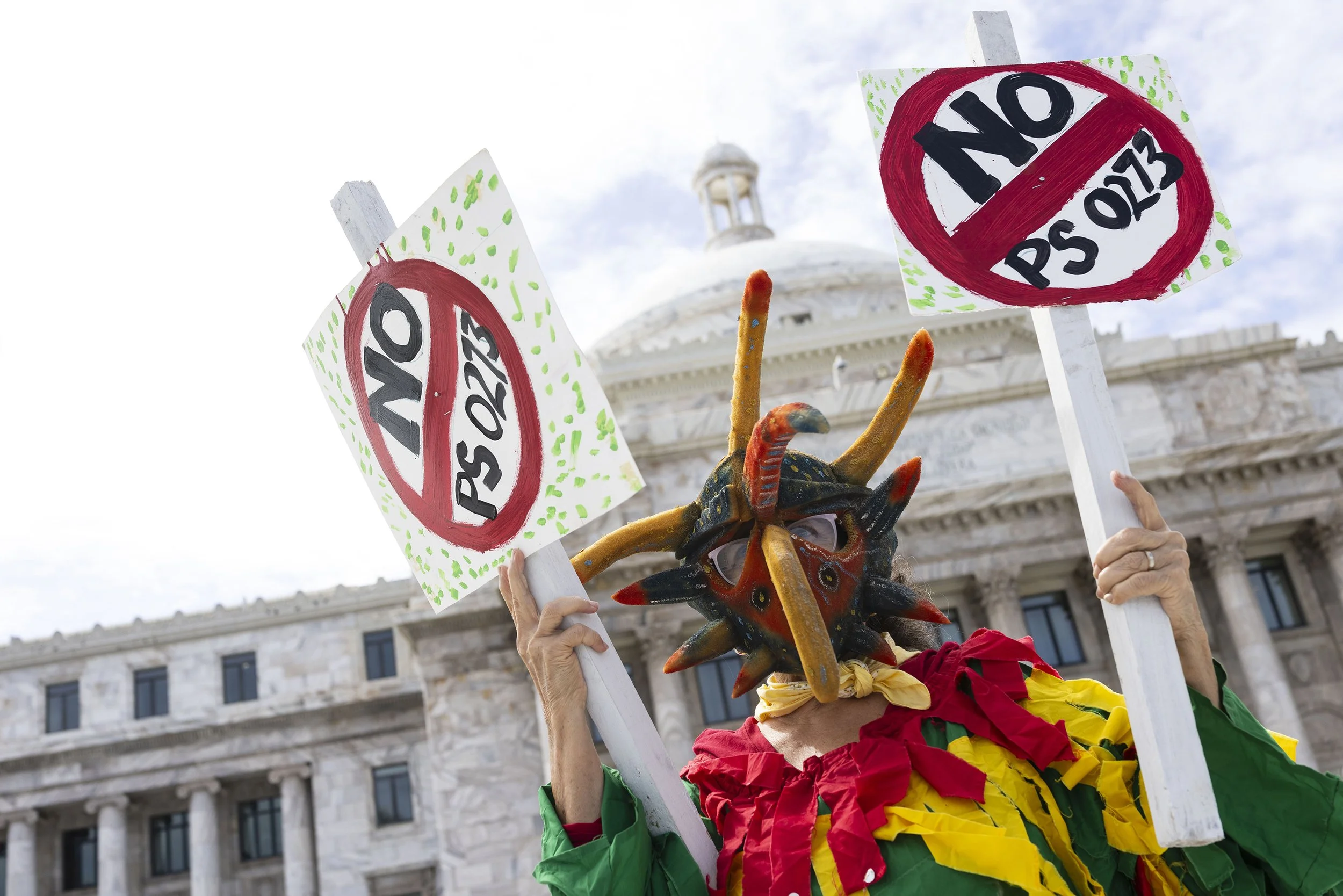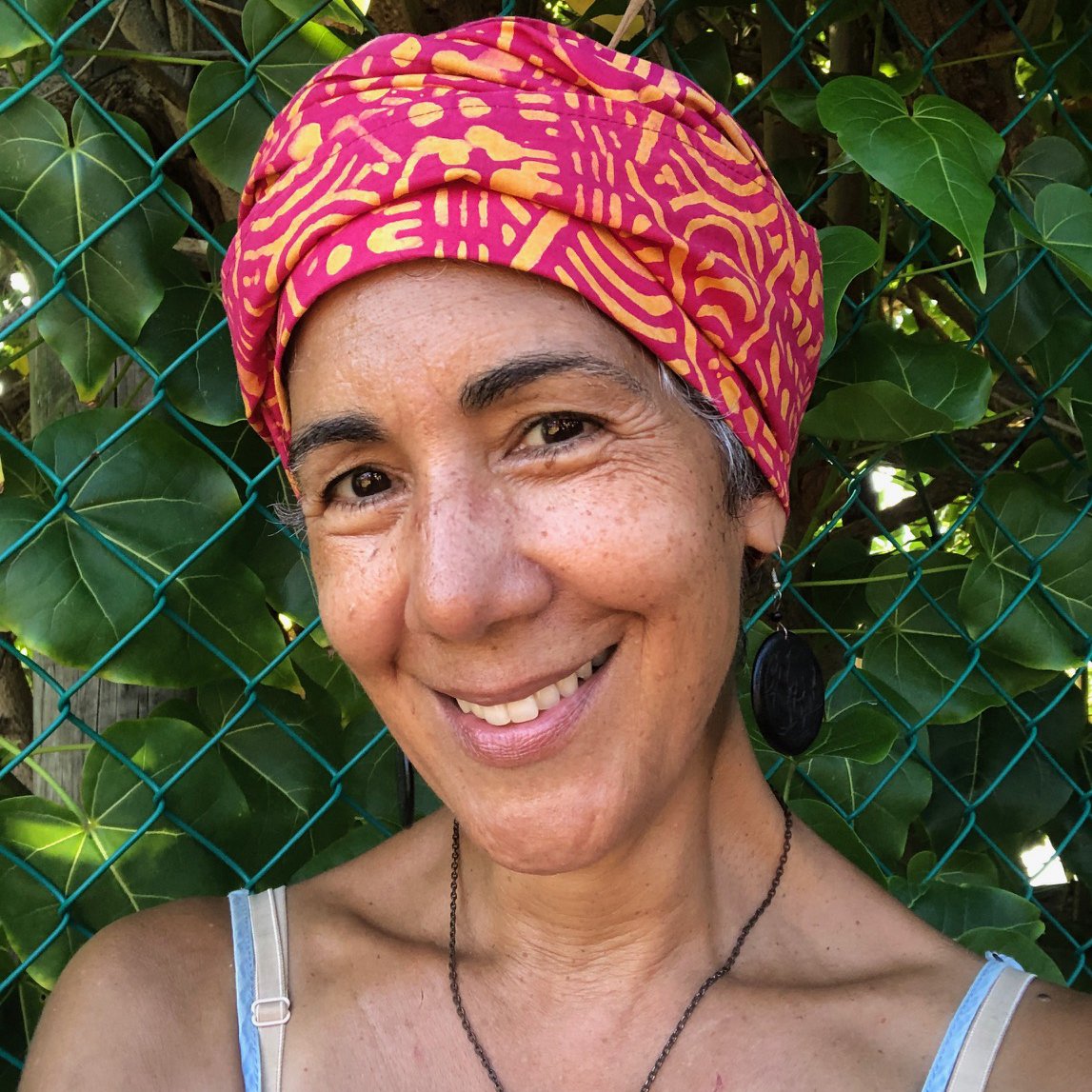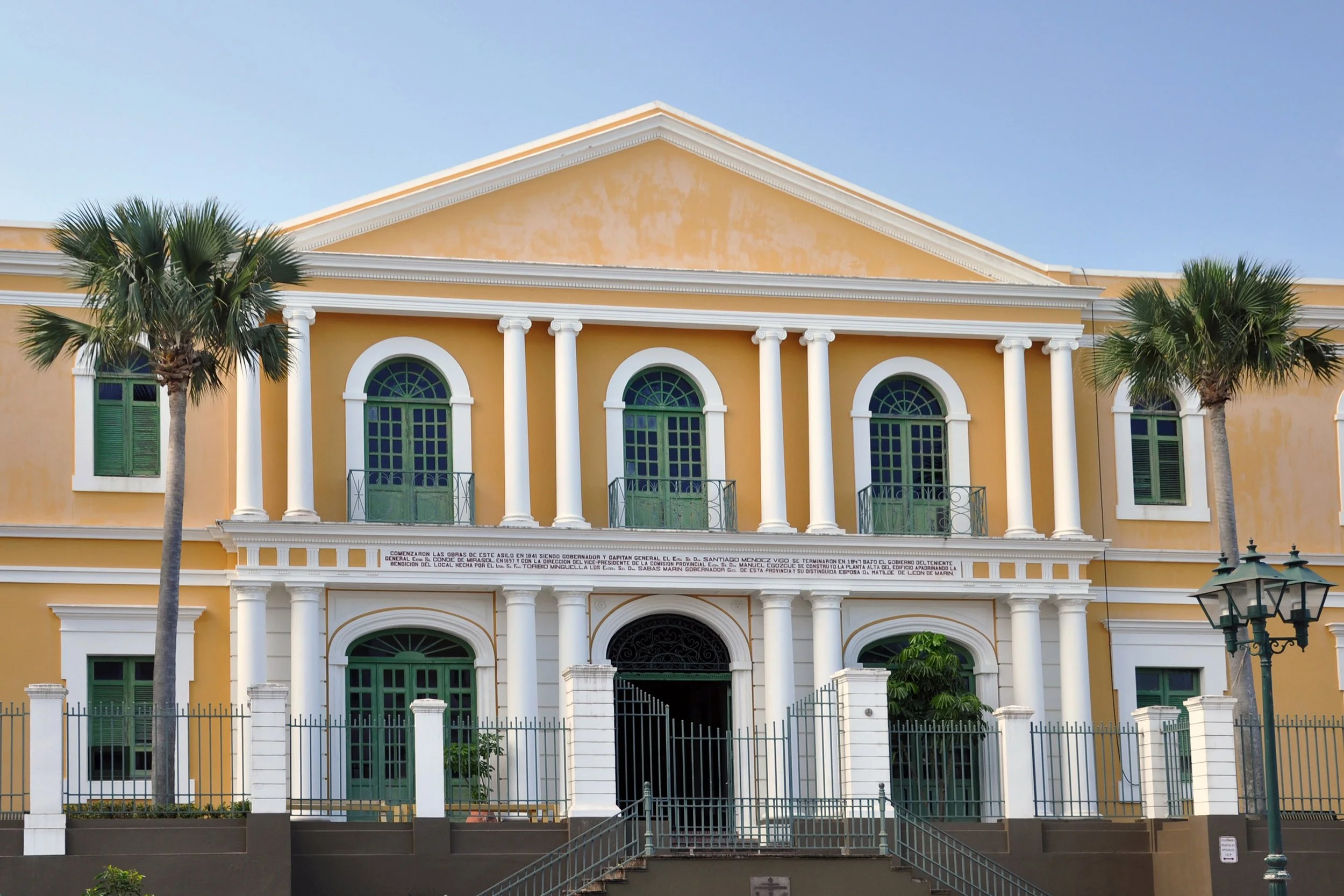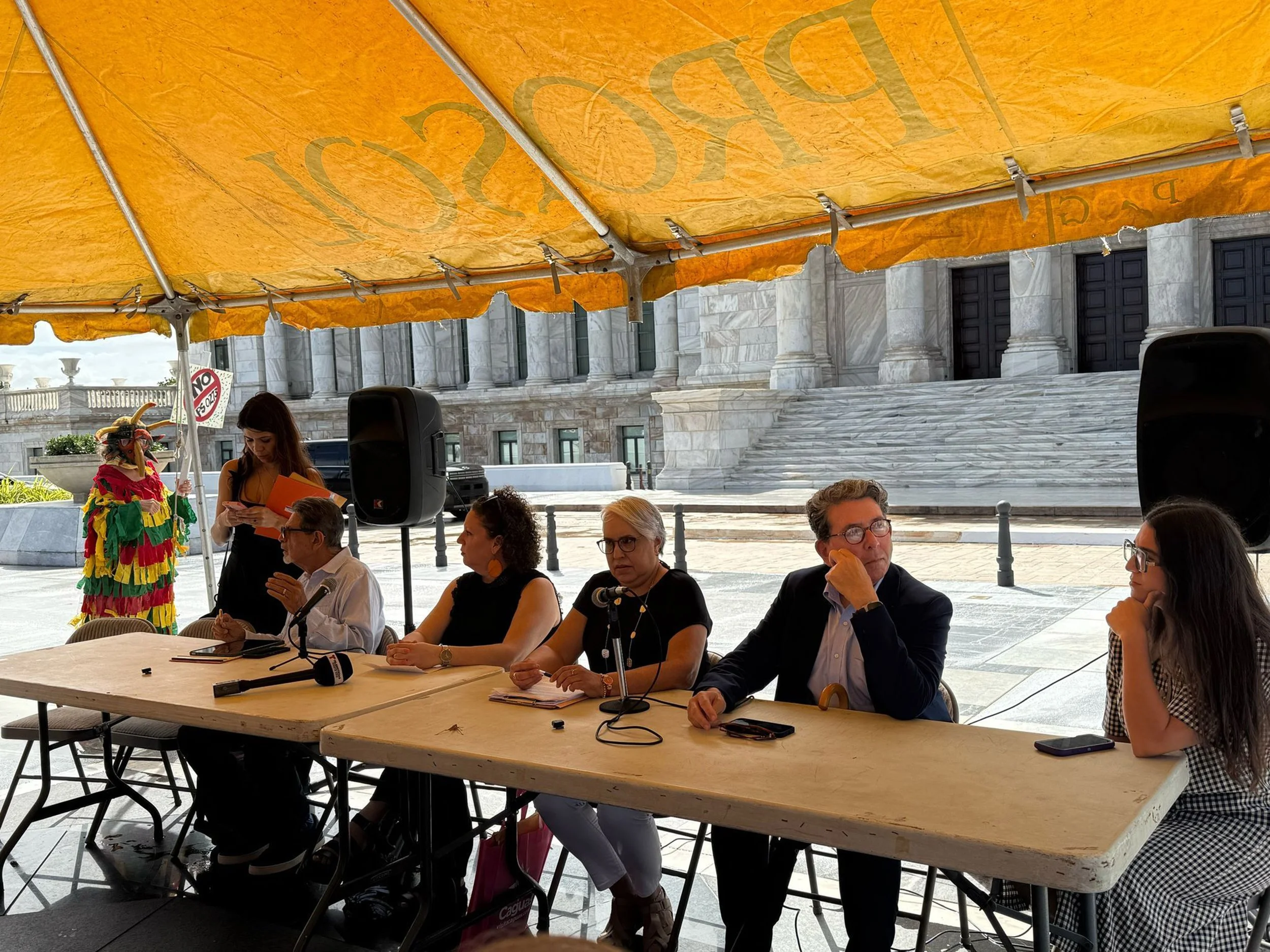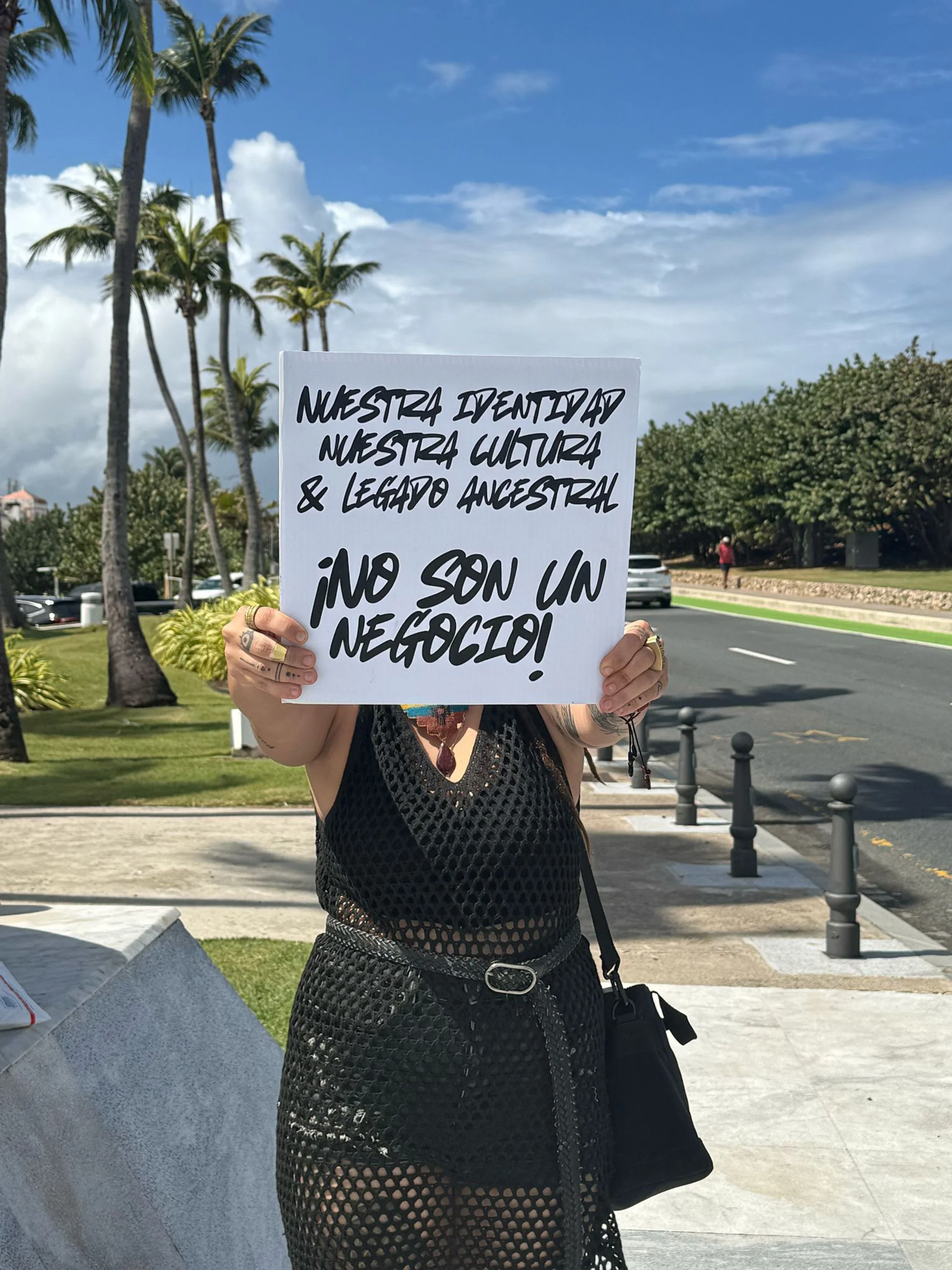Only the People Can Save the People: The Fight to Rescue the Institute of Puerto Rican Culture
A demonstrator at Democracy Plaza near the Capitol building in San Juan opposing legislation that aims to close and relocate the Institute of Puerto Rican Culture. Feb. 12, 2025. Photo by Xavier Araújo/GDA via AP Images
As legislation threatens to dismantle a 70-year-old legacy, artists and activists rally to defend the island’s cultural soul.
Haga clic aquí para leer este reportaje en español.
This summer, the Institute of Puerto Rican Culture (ICP in Spanish) turned 70. Amid celebrations across the island, a looming cloud threatens the iconic institution’s future as a piece of legislation in the island’s Senate seeks to dismantle it.
Back in January, Puerto Rico Senate President Thomas Rivera Schatz sponsored legislation to transfer ICP's roles to the Department of Economic and Business Development (DDEC).
Though the bill recognizes the institute's essential role to “preserve and promote Puerto Rican culture,” it criticizes what it calls the redundancy in critical function areas such as construction permits that “generate delays and negatively impact Puerto Rico’s infrastructure development,” adding that the ICP’s structure has become obsolete. While the ICP does not grant permits, it does evaluate building/construction projects to determine whether to endorse these with the Permit Management Office (the entity that coordinates and grants permits, licenses, and certificates relating to land use in Puerto Rico).
Established in 1955, the ICP conserves, promotes, enriches, and disseminates the arts, humanities, and cultural values of Puerto Rico. Among its responsibilities, it is charged with protecting archaeological sites. It serves as the custodian of Puerto Rico’s National Collection, which houses over 40,000 artifacts, including paintings, handcrafted wooden figures depicting traditional Puerto Rican scenes, and even swords from Spanish colonial times. With programming ranging from museums to parks to theaters, publications, and historical landmarks, one of its visions is to secure Puerto Rico’s standing as the Caribbean’s most important cultural center.
In February, responding to a request by Rivera Schatz, the institute released a report that revealed that 93% of its $20.8 million budget for fiscal year 2024-2025 was allocated for salaries and operating costs, leaving only $1.5 million for cultural activities.
But to understand the present, we must go back several years.
Facing a staggering $72 billion bonded debt by 2015, then-President Obama signed an austerity plan, the Puerto Rico Oversight and Management Economic Stability Act (“PROMESA”). Under PROMESA, a Financial Oversight and Management Board (known on the island as “La Junta”) was established and now monitors and certifies the island government’s annual budgets. La Junta remains at the helm of reductions in spending, an increase in taxes, and cuts to public sector employees' pensions.
Enter the ICP.
The Institute of Puerto Rican Culture, located in Old San Juan, Puerto Rico. Photo by P. Hughes via Wikimedia Commons
Its 2019 Report on the Financial and Administrative Crisis in the Institute of Puerto Rican Culture outlined the institute’s 13 programs and budgets for FY 2017-2021. Acknowledging the debt’s negative impacts, the ICP noted having reduced administrative spending in human resources during the past several years.
Five years later, what has changed? This June, coinciding with the ICP’s 70th anniversary, the institute’s newly appointed executive director, Melissa Santana Frasqueri, who came on board earlier this year, reaffirmed her commitment to a dialogue, saying she “came to put out fires and to work.” In a recent interview with the island daily El Nuevo Día, Santana Frasqueri acknowledged not yet meeting with Senator Rivera Schatz, but noted that, “One of the first priorities was the permits - down from over 600 to 49.”
For some, the ICP’s precarious future is all about cultural identity and alignment with the United States. In a podcast earlier this year, former Puerto Rican senator and political analyst Professor Ángel Rosa highlighted this, saying, “There’s a clear agenda hidden behind the justification of apparent efficiency for the economic and business development in Puerto Rico,” adding that Rivera Schatz is a proponent of U.S. statehood for Puerto Rico. This means, contends Rosa, the “complete acculturation, integration, and assimilation of Puerto Ricans so that we become North Americans or Americans of Puerto Rican ancestry, which is something else entirely.” For his part, in an April press conference, Rivera Schatz said, “The (legislation) doesn’t seek to eliminate the institute, it will relocate it.”
Though the senator’s office did not return palabra’s numerous emails or phone calls, he has stressed on various occasions that his bill is not a political issue.
‘Our call to the community generated multisectoral solidarity from artists, cultural activists, (and) diverse organizations who share profound pride and respect for our heritage.’
Concerns about its closure hit hard. palabra spoke with Marisel Flores Carrión, President of ProSol UTIER, the ICP’s workers' union, and director of the Moving Images Collection at the General Archives of Puerto Rico. “Our call to the community generated multisectoral solidarity from artists, cultural activists, (and) diverse organizations who share profound pride and respect for our heritage. From this coalition, we created Todo Puerto Rico por el Instituto de Cultura Puertorriqueña (All of Puerto Rico for the ICP; TPRICP, in Spanish), to raise awareness about the significance of the proposed legislation’s threat.”
The union leader criticized Rivera Schatz’s legislation, saying it “reduces the Institute to a mere event planning office when its mission is much broader.”
ICP workers union President Marisel Flores Carrión (center) with other opponents of dismantling the Institute of Puerto Rican Culture at a press conference in front of the island legislative building. Feb. 12, 2025. Photo courtesy of Todo Puerto Rico por El ICP
The Association of Cultural Centers of Puerto Rico (ACCPR) rejects the bill, called Senate Project 273 (or 0273). Established in 2013, ACCPR works with communities across the island to address specific needs ranging from the Indigenous legacy in the southern region to a youth theater collaboration in the central mountainous region, to organizing poetry readings on the eastern coast.
“Culture is a human right that shouldn’t be viewed from a commercial or limiting criteria that doesn’t appreciate the intellectual, spiritual, and social development of everyone,” the group says in a statement.
Support the voices of independent journalists.
|
In May, ACCPR met with over a dozen cultural center representatives to discuss the next steps in support of TPRICP. They agreed to set up an information kiosk at future cultural events to inform the public about the legislation. ACCPR President Héctor Valentín Yera said it was important to “raise awareness among the Puerto Rican people.” He told palabra that neither Senator Rivera Schatz nor ICP Executive Director Santana Frasqueri showed up at the meeting, nor have they contacted him.
Classical musician and composer William Ortiz Alvarado told palabra he’s against Project 273, but added, “They [ICP] need to organize themselves better to keep its identity and independence. It’s not working the way it should. They spend a lot of money paying these bureaucrats, and they don’t use it to go to the culture. A lot of people are criticizing. I don’t think they should dismantle it.” Ortiz Alvarado added that he approached the ICP about selling his album at their bookstore, and while they initially showed interest, they didn’t follow up.
A member of "Todo Puerto Rico por el ICP" (All of Puerto Rico for the ICP) coalition with a sign that says in Spanish, “Our Identity and Our Culture and Ancestral Legacy Are Not a Business,” during a press conference opposing legislation to dismantle the cultural institute. Feb. 12, 2025. Photo courtesy of Todo Puerto Rico por el ICP
Poet, podcaster, and painter Jenny Cruz is like many island artists and disagrees with the proposed legislation, saying, “It hurts to think that such an emblematic institution as the Institute of Puerto Rican Culture could be dismantled. (The institute) has been crucial in protecting our history, music, literature, (and) traditions. This legislation represents a direct threat to our cultural identity since it neither ensures continuity nor transparency nor focuses on the people. I wonder, what guarantees do we have that this new culture program will not simply be a bureaucratic political appendage without soul, without culture, without heart? Defending the institute is also an act of cultural resistance and a commitment to the future generations.”
Flores Carrión told palabra that ProSol UTIER is planning to meet with Senator Rivera Schatz during the upcoming Senate session, which begins on August 18th. She said that (in backing the ICP’s workers’ union) TPRICP continued to garner support from island residents.
As Valentín Yera told palabra, the main objective of requesting a meeting with Senator Rivera Schatz is to “know how far the proposed legislation extends because our cultural centers are the ones that stand the most to lose.”
—
Patricia Guadalupe, raised in Puerto Rico, is a bilingual multimedia journalist based in Washington, D.C., and is the co-managing editor of palabra. She has been covering the capital for both English- and Spanish-language media outlets since the mid-1990s and previously worked as a reporter in New York City. She’s been an editor at Hispanic Link News Service, a reporter at WTOP Radio (CBS Washington affiliate), a contributing reporter for CBS Radio network, and has written for NBC News.com and Latino Magazine, among others. She is a graduate of Michigan State University and has a Master’s degree from the Graduate School of Political Management at George Washington University. She is the former president of the Washington, D.C., chapter of NAHJ and is an adjunct professor at American University in the nation’s capital and the Washington semester program of Florida International University. @PatriciagDC

